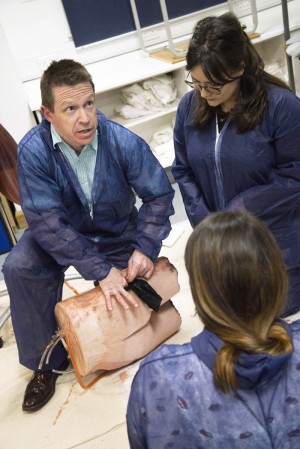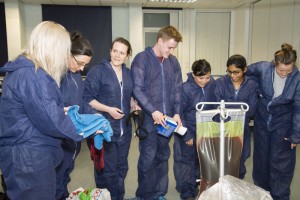Please note, this page has been archived and is no longer being updated.
Swansea University Medical School trauma expert Ian Pallister has taken on a new role that aims to save lives in the event of a terrorist attack or other mass casualty incident.
Professor Pallister, who runs the runs the MSc programme in trauma surgery, has become Welsh ambassador for the UK-wide citizenAID charity.
 It was set up by a group of civilian and military clinicians to prepare people, communities and organisations to help themselves and each other when there are multiple casualties – particularly from deliberate attacks.
It was set up by a group of civilian and military clinicians to prepare people, communities and organisations to help themselves and each other when there are multiple casualties – particularly from deliberate attacks.
Professor Pallister with one of the injury simulators, at the awareness event in Swansea University
Professor Pallister, also a trauma consultant at Morriston Hospital, has carried out award-winning work creating realistic models of bomb blast victims to help train military surgeons.
He set up a university spin-off company, Trauma Simulation Limited, to develop a range of training models that can also be used by medical students and by NHS staff.
Now Professor Pallister is leading the campaign in Wales to raise awareness of citizenAID and how people can help save lives following deliberate attacks with help from Swansea University medical students.
He said: “The concept behind it is to teach people what to do, how to communicate to the emergency services, and then, if they are with an injured casualty and in a position to help, the important first steps.”
One of the key resources citizenAid has made available is a free app providing step-by-step information on how the public can act to stay safe and save the lives of the injured.
There are clear, simple instructions on how to prioritise the injured, how to deal with life-threatening bleeding and how to communicate with the 999 services in a structured way.
 The app has been updated to include information on vehicle and acid attacks, alongside shooting, stabbing and bombing incidents.
The app has been updated to include information on vehicle and acid attacks, alongside shooting, stabbing and bombing incidents.
Right: Students get some life-saving training
Professor Pallister said: “It’s about having information there for them to look at, communicate effectively and be able help people.
“The way the advice is presented is pictorial with short bits of text conveying key messages.
“It’s almost like flat-pack furniture instructions with the distinction that you can actually follow them very easily.
“The charity also has teaching materials for different ages of schoolchildren, carefully tailored for different levels of understanding.
“However, the guiding principles are not to scare people but to prepare them at any age for how to keep themselves safe and do simple things to help each other.”
He worked with medical students Jordan Cazier and Sam James to help gauge awareness of the charity and they discovered only around one in five university students had heard of it, and of those, only about half had downloaded the app.
That was followed by a citizenAID event at the university, attended by around 40 medical, nursing and allied healthcare profession students.
They used specially-created models to learn how to apply pressure to control bleeding, pack wounds and improvise tourniquets.
Professor Pallister added: “The ethos is to help people prepare and not be scared. The odds of it happening to anyone are incredibly small.
“But the techniques that are applicable to helping people in mass casualty situations could be equally applicable if you find yourself first on the scene after a really bad motorcycle accident.”
- Thursday 16 May 2019 18.37 BST
- Thursday 16 May 2019 17.35 BST
- Swansea University, Tel: 01792 295050
